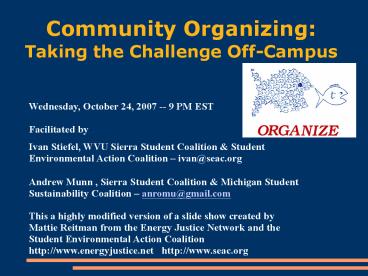Community Organizing: - PowerPoint PPT Presentation
1 / 21
Title:
Community Organizing:
Description:
part of a larger campaign. - Campaigns and actions should not be imposed upon communities. ... off campus, for more information on designing strategic campaigns ... – PowerPoint PPT presentation
Number of Views:3335
Avg rating:3.0/5.0
Title: Community Organizing:
1
Community Organizing Taking the Challenge
Off-Campus
Wednesday, October 24, 2007 -- 9 PM
EST Facilitated by Ivan Stiefel, WVU Sierra
Student Coalition Student Environmental Action
Coalition ivan_at_seac.org Andrew Munn ,
Sierra Student Coalition Michigan Student
Sustainability Coalition anromu_at_gmail.com This
a highly modified version of a slide show created
by Mattie Reitman from the Energy Justice Network
and the Student Environmental Action
Coalition http//www.energyjustice.net
http//www.seac.org
2
Introductions Hello! - Go Around -
East to West Name Community 5 minutes
3
- Objectives
- By the end of this phone-training, participants
will - - Have a clearer idea of how to take the
Challenge off campus - - Have a clearer power analysis and view on how
to build power - - Have a clearer understanding of how people act
- - Have the ability to use 1 on 1s as an
organizing tool - Have the ability to apply workshop ideas to our
work - 2 min
4
Organizing
- If youve organized on your campus, you already
know a lot about organizing. - Why you organize is the same on campus and off
campus. - Saul Alinskys Three Principles of Organizing
- -Give People a sense of their own power!
- -Create real improvements in peoples daily
lives! - -Change the balance of power!
- 2 minutes
5
POWER Who has it? What is it? Power is the
Ability to Do! 3 minutes
6
How do you build power?
3 minutes
7
5 minutes
4 types of power
8
- How Do People Act?
- -Selflessly Putting others above ones self
- -Selfishly Putting ones self above others
- -In Self-Preservation Acting to maintain ones
survival - -In their Self-interest Acting to benefit ones
self and ones community
4 minutes
Bang!
9
Self-Interest As organizers trying to connect
people together and build power with, it is
critical that we are aware of peoples
self-interest. When organizing, what is your
self-interest? - Why do you care? - Do you want
to enter a community off your campus and organize
there? - Yes, then youre community
organizing - Do you want to build a relationship
with pre-existing community organizations? -
Yes, then your standing in solidarity with a
community - Solidarity Mutually beneficial,
reciprocal relationships where both groups
interests are advanced. Picking Your Issue is a
Privilege -communities don't choose to get
polluted!
5 minutes
10
What do Grassroots Groups Work On? Two types
offence and defence -offence community
gardens, service programs (i.e. Black Panther
free breakfast program), Cool Cities, etc.
-defence landfills, incinerators, power plants
(coal, nukes, natural gas), refineries (oil,
ethanol), sewage sludge dumping (as fertilizer
on farm fields or in strip mines), fluoridation
of drinking water, toxic waste site cleanup,
waste transfer stations, ash dumps, medical waste
facilities, nuclear facilities (waste
storage/disposal, nuclear fuel processing
facilities), roads/highways, power lines,
pipelines, liquefied natural gas (LNG) terminals,
mining/quarries (coal, limestone, aggregate,
etc.), development/sprawl (housing developments,
box stores, etc.), paper mills, cement kilns,
logging, water extraction (bottled water or for
energy or other industries), factory farms,
chemical plants... 2 minutes
11
WHAT DOES AN ORGANIZER DO? Research Talk to
people! to find out 1) Social, political,
economic, and cultural past and present. 2) Past
and present status of organizing and activism
around community issues. 3) Groups and
individuals already working on similar issues. 2
minutes
12
Developing Relationships Methods Broad -
tabling at community events, organizing your own
events, creation and distribution of literature,
telephone calls, media, actions, door to door
(listening projects) -be brief -engage in
a familiar and comfortable setting -gauge
people's interest, get contact info -Identify
people to do 1 on 1s with Focused - Using
pre-existing networks, meeting with pre-existing
and potential community leaders Teachers, church
leaders, heads of organizations, anyone who has
shown motivation in the past, people with
followers - Do a 1 on 1. 2 minutes
13
1 on 1s They're important! Goals - Human
connection - Create a memorable moment - Get
contacts - Question, Listen, Listen, Share,
Listen, Listen, Listen, - Create tension that
leads to growth - Identify self interest -
Expand Self interest 4 minutes
14
Identifying Self Interest 5 min Head
What does this person think about? Hands What
do they like to do? Heart What motivates them
emotionally? Gut What sustains them? Feet
What gets them moving?
15
Bringing People Together 1. Community
Meetings -Connecting people with similar
interests, get them talking to each other, not
listening to you. -Try and keep it
comfortable/familiar -After people are
comfortable, get them talking about next
steps -Remember it's about generating ACTION!
3 minutes
16
2. Actions - Bringing people together to take
action at times can be a good way to build
community - Actions should always be
strategic!, part of a larger campaign. -
Campaigns and actions should not be imposed upon
communities. They should be in their self
interest. This training has been about how to
build power off campus, for more information on
designing strategic campaigns and using power,
consult the Sierra Clubs campaign planning
Matrix or the Midwest Academys Strategy
Chart! 2 minutes
17
Roadblocks? What are some problems and
difficulties you can foresee in doing this kind
of work? 5 minutes
18
Examples of Campus-Community Collaboration
2 minutes
19
Debrief What will you take away from this
training? 10 minutes
20
Upcoming Events! Upcoming things to plug into
-Step It Up 2! lt www.stepitup2007.org gt -Power
Shift lt http//powershift07.org gt -Mountain
Justice Spring Break lt www.climateaction.net/mjsb
gt -Mountain Justice Summer lt www.mountainjustices
ummer.org gt -Energy Justice Summer lt
www.energyjustice.net/ejs gt Other
Resources -Cool Cities http//coolcities.us/ 3
min
21
Evaluation -How did it go? Can you use
this? 3 min































